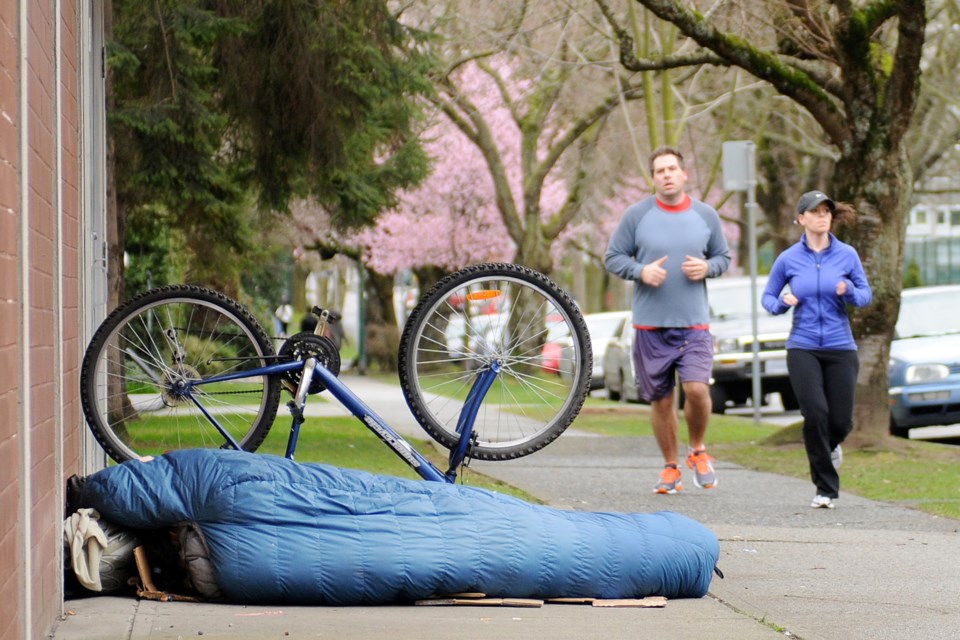Mayor Gregor Robertson’s promise to end street homelessness by 2015 seems unlikely now that new data released Wednesday shows the city is more than 700 housing units short of its projected goal to have homes available for low-income people.
A combination of vacant single-room-occupancy hotel rooms under renovation and delays in opening interim housing and completing supportive housing sites, along with the cancellation of a federal housing program for mentally ill people, signals what could be a substantial rise in people living on the street in Vancouver.
“That’s a lot of beds and units that are no longer available to us and just contribute to that sense of we’re starting to perhaps go backwards,” said city manager Penny Ballem in addressing council Wednesday.
The mayor and city staff are expected to learn next week how many people are living on the street and in shelters when the Metro Vancouver homeless count results are released.
Ballem’s presentation to council, however, suggested she knows bad news is coming and showed two graphs put together last year that outlined the best and worst case scenarios related to the city’s strategy to end homelessness.
The best case scenario for 2014 would see 1,327 people in shelters or temporary housing and 187 people on the street. The worst case scenario, which the mayor acknowledged is where Vancouver is likely headed, shows 938 people in shelters or temporary housing and 1,044 on the street.
That number of street homelessness — 1,044 — would be unprecedented for Vancouver, with the highest being 811 in 2008. Last year’s count showed 273 people living on the street and 1,327 in shelters or temporary housing.
The dire news delivered by Ballem comes less than two months after Robertson told reporters — after participating in March’s Metro Vancouver homeless count — that he anticipated the city would see a decrease in homelessness this year.
He based his assessment on the city’s purchase of the 95-room former Biltmore hotel and 57 rooms at a former Ramada hotel on East Hastings. The city also purchased another Ramada on Kingsway and is expected to open Taylor Manor on Boundary Road by the end of the year.
In addition, nine of 14 supportive housing buildings built under an agreement involving the provincial government, the city and the Streetohome Foundation are now open. The remaining five buildings are expected to be completed this year. Altogether, the 14 buildings have more than 1,500 units.
Robertson told reporters Wednesday the new data coupled with delays has changed his assessment of the state of homelessness in Vancouver, saying “it looks like a very disturbing situation emerging” and acknowledged “we’re trending now towards worst case (scenario).”
“We’re going to need to make some urgent moves to keep on track to hit our goal to end street homelessness by 2015, which is still our goal,” said the mayor, noting Ballem’s update to council was spurred on by reports in the Downtown Eastside of people losing their housing and overflowing shelters.
NPA Coun. George Affleck said he was surprised by the timing of Ballem’s presentation, which was requested by the mayor only a day earlier. Affleck suggested the release of the new data was to lessen the impact of what is expected to be bad news for the mayor’s Vision Vancouver party when next week’s homeless numbers are released.
“They are putting their PR game together right now to deal with the fact that they are failing at their plank issue that won them the last election,” he told the Courier. “It’s a failure, it’s mismanagement on their part, it’s politics at its worst. This was an impossible promise [to end street homelessness] to make.”
Adding to Vancouver’s low-income housing shortage is the steady increase in rents for single-room-occupancy hotels, which have priced many people on welfare out of a home. In 2007, 60 per cent of single-room-occupancy hotels rented at the shelter rate of $375 per month or lower. Now only 24 per cent of the hotels rent at those rates.
Winter shelters have also been at capacity and Ballem said the city received government funding for about 55 fewer beds this season. The cancellation of the Mental Health Commission’s Chez Soi program at the former Bosman hotel and sites scattered around the city, along with closure of the former Dunsmuir hotel, have also affected the shortage of housing for low-income people.
Both the mayor and Ballem didn’t point fingers at one agency for the city falling short of its housing projections but Robertson said the city, provincial and federal governments could all be doing more to end street homelessness.
“We all need to step up and take it to the next level,” he said.
The B.C. government has said it has developed or preserved 6,700 housing units in Vancouver since 2001 and committed $143 million to renovate and restore more than a dozen single-room-occupancy hotels in the Downtown Eastside.
The government is also on record of saying it invested more than $116 million to provide subsidized housing, rent supplements and emergency shelter services to more than 26,000 low-income people in Vancouver.
Over the past few years, the government and the city have sparred over who should move in to the new 14 supportive housing buildings. That fight was acknowledged by Ballem in her presentation.
“I would say it’s been a challenge and a lot of work to ensure that those 14 sites are focused on sheltered and street homeless,” she said. “It’s not an easy thing but I think everybody has understood that when you start showing these metrics, that if we don’t do that, we’re not going to solve these problems.”
twitter.com/Howellings



